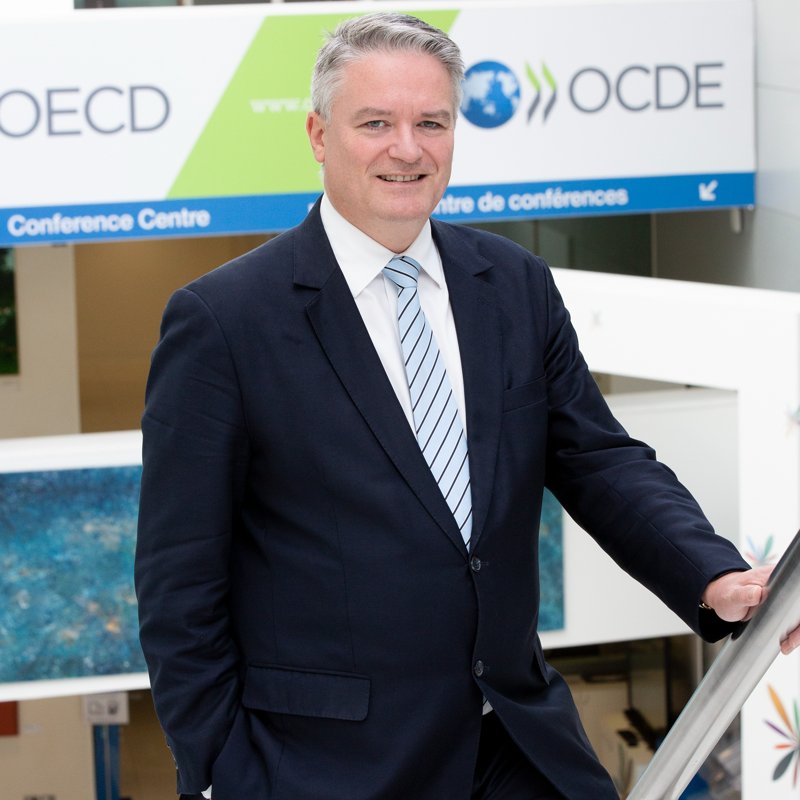OECD: Kazakhstan is a key partner in regional reform and green growth
Mathias Cormann, Secretary-General of the Organisation for Economic Co-operation and Development (OECD), spoke with a correspondent of Kazinform News Agency in an exclusive interview. He shared insights into the deepening OECD–Kazakhstan cooperation, highlighted progress in investment and governance reforms, and discussed opportunities for closer regional engagement — including the potential opening of a regional OECD office in Astana.

How do you assess the current cooperation between the OECD and Kazakhstan? What key achievements have been made in recent years?
The OECD’s cooperation with Kazakhstan has deepened significantly over the past decade, with the completion of a Country Programme and the progressive implementation of two Action Plans since 2015. Currently, we are working together on a range of areas, including public governance and corporate governance of state-owned enterprises, connectivity, critical raw materials, green growth and sustainable infrastructure.
At the Astana International Forum today, we are launching a new ‘Governance Scan’ that analyses Kazakhstan’s public administration reform to realise Kazakhstan’s 2030 Concept for Public Administration Development and provides recommendations to strengthen citizen participation, improve human resources management, strengthen the Kazakh civil service’s capacity to innovate and the digitalisation of public services. Last year, we completed a review of Kazakhstan’s State-Owned Enterprises (SOEs) in support of the country’s ambitious reform plans in this area, recommending a streamlined ownership structure, an improved legal definition of an SOE, and greater transparency in the functioning of the management boards. We also welcome Kazakhstan’s active role in OECD multilateral tax work, through the Base Erosion and Profit Shifting initiative.
Kazakhstan has shown leadership in fostering green growth, digitalisation of border procedures, and trade connectivity, notably through the Trans-Caspian Corridor – a trade route with enormous potential, which we look forward to helping realise.
Our joint work on sustainable infrastructure is helping Kazakhstan achieve its carbon neutrality objectives. The OECD will also be a knowledge partner of Kazakhstan’s Regional Climate Summit in Central Asia in 2026, announced by President Kassym-Jomart Tokayev at COP29 in Baku last year.
These achievements reflect a shared commitment to inclusive growth, connectivity, and regional integration that are at the heart of our partnership.
Kazakhstan is implementing reforms to improve its investment climate. What recommendations from the OECD could accelerate this process?
Kazakhstan has made commendable progress in improving its investment climate, as noted by the OECD ongoing Public Integrity Review (forthcoming in 2025), prepared in cooperation with the Anti-Corruption Agency of Kazakhstan, in terms of boosting transparency of the justice system, and advancing in the fight against foreign bribery. We see opportunities for further improvement in strengthening judicial independence and aligning corporate liability and conflict-of-interest legislation with international standards, such as the OECD Recommendation on Public Integrity.
In terms of design and implementation, we recommend improving regulatory predictability and steps to close the so-called ‘implementation gap’ that sometimes exists between legal provisions and actual practice for entrepreneurs and investors.
In the sphere of state-owned enterprises governance, we recommend clearer separation of ownership and regulatory functions – when the two overlap, it can create unfair competitive conditions on the market. Improving competition policy and strengthening competition institutions should help further the level the playing field for business and investors.

In which economic sectors could Kazakhstan most effectively apply the best practices of OECD countries?
Reforms to enhance competition, reduce conflicts of interest, and ensure fair treatment of investors — both domestic and foreign— are essential. Kazakhstan’s efforts to digitalise government services to business and improve state-owned enterprise governance are also steps in the right direction.
Having said that, we do recognise the peculiar challenges that some economic activities raise. For example, we have been working with Kazakhstan on the development of the critical raw materials sector. Kazakhstan is well endowed with minerals that will be vital to the net-zero transition, but realising that potential in a socially and environmentally sustainable way will not be easy, so we have been in dialogue with the authorities and the private sector on such issues as taxation in the critical minerals sector, sustainable mining practices and responsible business conduct.
How can Kazakhstan strengthen its integration into global value chains, considering the experience of OECD countries?
Kazakhstan’s location at the heart of Eurasia has made it a natural partner for the OECD in addressing the trade integration challenge. Kazakhstan plays a pivotal role in the Trans-Caspian Transport Corridor, and the OECD Trade Facilitation Indicators show that Kazakhstan has been the top reformer in the region since 2017. It outperforms most upper-middle-income countries worldwide.
Our report last year on the Trans-Caspian route finds that realising its potential as an engine of trade growth and integration will require coordinated infrastructure investment, regulatory harmonisation, and further trade facilitation reforms. This is in addition to overall business environment reforms I mentioned above.
In April 2025, the OECD also published a Scoreboard to measure and monitor economic corridors’ connectivity, with a case study on the Middle Corridor, recommending for Central Asia and Kazakhstan to boost trade-related information availability and external border cooperation, which continue to burden connectivity despite progress in digitalisation, trade facilitation, and regulatory harmonisation. We also recommend providing economic incentives to decrease transport costs, including insurance and freight, which currently exceed global benchmarks.
Previously, the Head of the Eurasia Division at the OECD Directorate for Global Relations and Cooperation, William Tompson, discussed the possible prospects of opening a regional OECD office in Astana during a meeting with the Deputy Prime Minister and Minister of National Economy of Kazakhstan, Serik Zhumangarin. How realistic is the prospect of opening a regional OECD office in the Kazakh capital? What steps are necessary to achieve that?
The OECD and OECD Member states are reflecting on how to ensure that OECD offices outside of Paris best support the promotion of OECD standards across the regions with which we work, while balancing budgetary and human resources considerations.
Kazakhstan’s offer to host such an office reflects its commitment to getting closer to OECD standards, while showcasing regional leadership in terms of the adoption of OECD good practices.
The final decision rests with OECD members. The next steps would include further consultations with Members and among Members, before we can make any decision.
What advantages does the OECD see in establishing its representation in Kazakhstan?
We remain committed to enhancing our policy engagement with Kazakhstan and countries across the region with our global policy best practices and unique evidence base, particularly around issues of connectivity, which are critical for the region.
While it is ultimately up to OECD member countries to decide on the establishment of an office in Kazakhstan, we look forward to continued discussions with our members and our Kazakh partners on how to continue enhancing engagement.

What contribution could a regional OECD office make to the development of Central Asian countries?
Kazakhstan has long supported OECD work not just with itself but with its regional peers. For example, Kazakhstan is a regional leader of the Energy, Water, Land-use Nexus Programme in Central Asia (2024-2028) implemented by a consortium of international partners led by the OECD and a local partner - Scientific-Information Center of the Interstate Coordination Water Commission of the Central Asia. Kazakhstan is the co-chair of OECD’s Central Asia Initiative of the Eurasia Competitiveness Programme and hosted in Almaty in October 2017 the first OECD-Eurasia week to be held outside of Paris.
Further opportunities for engagement include: regional integration and connectivity, in the context of the Trans-Caspian Transport Corridor; good governance and the need to level the playing field for businesses in Kazakhstan and Central Asia; and responsible investment in the extraction and processing of critical raw materials, an area that is critical to achieving the green transition, and sustainable infrastructure.
How can Kazakhstan enhance the sustainability and environmental responsibility of its mining industry in line with OECD standards?
Kazakhstan has already embedded the OECD Due Diligence Guidance for Responsible Mineral Supply Chains in regulations and market and audit requirements for 15 minerals and metals. This is an important step, but we see several opportunities for further alignment. These include strengthening environmental regulations, enforcing transparent reporting, and promoting stakeholder engagement. Investing in cleaner technologies, rehabilitating mining sites, and ensuring community benefits are also key.
The OECD has launched an initiative on making critical minerals work for sustainable growth and development that builds on our multidisciplinary expertise to ensure that the mining of critical minerals contributes to social and environmental sustainability. In March this year, we had a day-long seminar in Astana attended by over 80 Kazakhstan stakeholders. And we plan to continue this work, in partnership with Kazakhstan and also with other countries of the region, through this initiative.
What measures does the OECD recommend to attract investment in the critical raw materials sector?
The most important priority for foreign investors is a stable and predictable business environment and a level-playing field, backed by the rule of law and reliable contract enforcement.
A level playing field on responsible business conduct is important in all sectors of the economy but has particular relevance to critical raw materials. A policy environment where transparency is the norm, and which encourages efforts to mitigate prevailing environmental, social and governance risks can help build investor confidence. The OECD Guidelines for Multinational Enterprises on Responsible Business Conduct and the OECD Minerals Guidance support such transparency, including by adapting the information companies share through these standards to financial risk management frameworks. Governments can also further support early-stage projects through public-private partnerships, while donors and international financial institutions can also contribute by providing development assistance financing. Finally, policymakers should be mindful of tax compliance risks or unintended consequences on value added in non-mineral sectors when introducing industrial policies like export restrictions, and seek to maintain open trade policies to further enhance predictability.
Overall, responsible governance and transparency are essential to lowering political and operational risks, making the sector more attractive for long-term, sustainable investment.
Earlier, it was reported that OECD Secretary-General Mathias Cormann is scheduled to make his first visit to Kazakhstan to participate in the Astana International Forum in May 2025.
